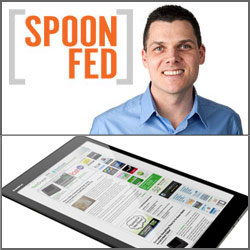Can the CrunchPad Beat Apple’s Tablet? It Doesn’t Need To.
The race is on. And the deadline is September, October, or November. Or early next year. Or whenever Apple decides to launch its rumored touchscreen tablet. Windows-notebook manufacturers simply don’t know when the so-called iPad is going to debut. And they are all working feverishly to get their own touchscreen notebooks out the door—preferably in time for the October 22nd launch of Windows 7, which supports multitouch gestures. Will any of these machines have a chance against Apple? Perhaps, but a complete outsider may have the best shot at raining on the iPad’s parade. Dreamed up by TechCruch founder Michael Arrington, and being manufactured by Singapore-based Fusion Garage, the CrunchPad is a 2.6-pound touchscreen device with a 12-inch display that’s designed to do one thing: get people online fast. The rumored specs include a 1.6-GHz Intel Atom processor, 1GB of RAM, a single USB port, and Wi-Fi connectivity. The amount of actual onboard storage is not known, but it’s likely 4GB or less. And other than a WebKit-based browser, users shouldn’t expect much in the way of software. With such skimpy specs, why would anyone buy a CruchPad over Apple’s device, or any Windows 7-powered tablet? There is something to be said for the CrunchPad’s simplicity. There are a lot of consumers who just want to surf the Web, check Facebook, and e-mail without booting a sophisticated operating system. It’s the whole reason why Google is creating the Chrome OS. And with a built-in accelerometer, the CrunchPad could double as a great digital reading device, offering vertical viewing angles for displaying more text at a glance. There’s just one, potentially-huge stumbling block: the rumored $400 price tag. Now that you can get a good 10-inch netbook (without touch) for $399, with a physical keyboard, 160GB of storage space, and a battery that can last more than 9 hours on a charge, an identically-priced touch tablet with a slightly-larger screen could be a tough sell. But I wouldn’t write the CrunchPad off yet. Because the device supports 3G connectivity, a carrier (or retailer) could sell the CrunchPad for much less, with a two-year contract. For example, Best Buy recently began selling a 99-cent Compaq netbook that is subsidized by Sprint’s mobile broadband service. And it’s a good sign when Best Buy’s chief marketing officer tweets that the CrunchPad is a “great-looking device,” and that he thinks “it will be a real hit,” which he did yesterday. Plus, there are other ways to subsidize this tablet. Given that Rupert Murdoch just made it official that he will begin charging users to read all of his news sites by next summer, and that The New York Times is also looking at ways to get readers to pay, media companies could give away the CruchPad, or sell it for a deep discount when bundled with subscriptions. Does the CrunchPad really stand a chance against the iPad, which will likely have lots of cool applications, built-in iTunes, and other goodies only Apple can deliver? I don’t think the CrunchPad has to challenge Apple directly. Both devices will have a place in the market, with the CrunchPad being the 21st-century equivalent of an Internet appliance and the iPad being a premium media-centric, app-centric touchscreen computer. Nevertheless, a subsidized CrunchPad has a much better chance at enticing consumers than one that’s priced the same as fuller-function netbooks. Editor-in-chief Mark Spoonauer directs LAPTOP's online and print editorial content and has been covering mobile and wireless technology for over a decade. Each week Mark's SpoonFed column provides his insights and analysis of the biggest mobile trends and news. You can read SpoonFed here each week or have even more industry news delivered to your inbox with the SpoonFed newsletter. You can also follow him on twitter.
Sign up to receive The Snapshot, a free special dispatch from Laptop Mag, in your inbox.


